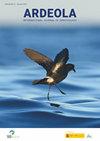食物可得性和亲代风险对花斑捕蝇家蝇羽化期的影响
IF 1.2
4区 生物学
Q2 ORNITHOLOGY
引用次数: 3
摘要
总结。羽翼发育的时间对晚育鸟类至关重要,因为它影响后代的生存概率,从而影响亲代和后代的健康。幼鸟在羽化后不久就容易被捕食,这可能会引起父母与后代在羽化年龄方面的冲突,因为父母在羽化前减少整个种群的脆弱期比后代受益更多。父母还可以通过减少通勤成本和减少接触捕食者来诱导雏鸟早期发育。因此,巢附近可靠的食物资源有利于放松父母诱导羽化的冲动,并从后代的角度来看,使其接近最佳羽化年龄。研究人员在巢箱中随机选择一对欧洲斑姬蝇,在雏鸟期间向其提供食物补充剂(活粉虫),并将雏鸟年龄与未提供食物补充剂的巢进行比较。供给父母也被困在巢箱中,以估计它们遭受捕食风险的意愿,即容易被捕获(可诱捕性)。羽化年龄15 ~ 20天。补食巢(n = 21)羽化时间比对照巢(n = 20)平均晚1天,差异显著。这并不是因为13天时雏鸟的大小和质量,两种处理下的雏鸟大小和质量相似。羽化年龄与亲本诱捕性呈正相关。在巢附近容易获得食物的父母和那些更愿意冒险被捕食的父母是那些雏鸟长大后才羽翼丰满的父母。显然,父母会根据觅食成本调整后代羽翼未丰的时间。——莫雷诺(2020)。食物可得性和亲代风险对育巢期持续时间的影响:斑姬捕蝇蝇田间试验。《农业科学》,67:29-38。本文章由计算机程序翻译,如有差异,请以英文原文为准。
Effects of Food Availability and Parental Risk Taking on Nestling Period Duration: A Field ExperimenT on the Pied Flycatcher Ficedula hypoleuca
Summary. The timing of fledging is critical in altricial birds as it affects offspring survival probability and thereby both parental and offspring fitness. The high vulnerability of offspring to predation soon after fledging may induce a parent-offspring conflict with respect to the age of fledging, as parents would benefit more than offspring from reducing the period of whole-brood vulnerability before fledging. Parents also benefit from inducing early fledging through reduced commuting costs and a decreased exposure to predators. A reliable food resource near the nest could thus favour a relaxation of parental drives to induce fledging and enable an approach to the optimal fledging age from the offspring point of view. A population of a cavity nester, the European Pied Flycatcher Ficedula hypoleuca, was offered food supplements (live mealworms) at the nest-box to randomly selected pairs throughout the nestling period and fledging ages were compared with those at nests without supplements. Provisioning parents were also trapped at the nest-box to estimate their willingness to incur predation risks in terms of easiness of capture (trappability). Fledging ages ranged from 15 to 20 days. Fledging was delayed in food-supplemented nests (n = 21) compared with control nests (n = 20) by one day on average, a significant difference. This was not due to the size and mass of nestlings at 13 days, which were similar under both treatments. Moreover, fledging age was positively related to parental trappability. Parents with easy access to food near the nest and those more willing to risk predation were those whose nestlings fledged at older ages. Parents apparently adjust the timing of offspring fledging to their foraging costs.—Moreno, J. (2020). Effects of food availability and parental risk taking on nestling period duration: a field experiment on the Pied Flycatcher Ficedula hypoleuca. Ardeola, 67: 29-38.
求助全文
通过发布文献求助,成功后即可免费获取论文全文。
去求助
来源期刊
CiteScore
2.30
自引率
6.20%
发文量
16
审稿时长
>12 weeks
期刊介绍:
Ardeola: International Journal of Ornithology is the scientific journal of SEO/BirdLife, the Spanish Ornithological Society. The journal had a regional focus when it was first published, in 1954. Since then, and particular during the past two decades, the journal has expanded its thematic and geographical scope. It is now a fully international forum for research on all aspects of ornithology. We thus welcome studies within the fields of basic biology, ecology, behaviour, conservation and biogeography, especially those arising from hypothesis-based research. Although we have a long publication history of Mediterranean and Neotropical studies, we accept papers on investigations worldwide.
Each volume of Ardeola has two parts, published annually in January and July. The main body of each issue comprises full-length original articles (Papersand Review articles) and shorter notes on methodology or stimulating findings (Short Communications). The publication language is English, with summaries, figure legends and table captions also in Spanish. Ardeolaalso publishes critical Book Reviewsand PhD-Dissertation Summaries; summarising ornithological theses defended in Spain. Finally there are two Spanish-language sections, Ornithological News; summarising significant recent observations of birds in Spain, and Observations of Rare Birds in Spain, the annual reports of the Spanish Rarities Committee.

 求助内容:
求助内容: 应助结果提醒方式:
应助结果提醒方式:


